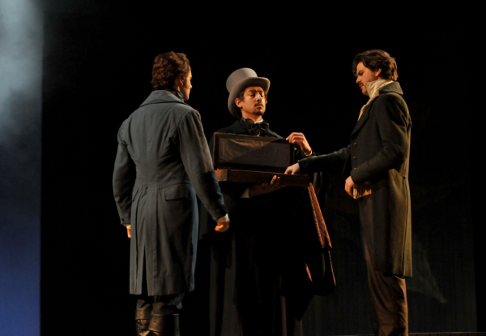Pyotr Ilyich Tchaikovsky wrote the opera Eugene Onegin together
with librettist Konstantin Shilovsky. They followed Alexander Pushkin’s verse
novel of the same name very closely and retained a great deal of his poetry.
Shilovsky’s contributions included the verses sung by the French speaking
Monsieur Triquet in Act II. The composer wrote the text for Lensky’s Act I
arioso and most of Prince Gremin’s Act III aria. Nikolai Rubenstein conducted
Moscow Conservatory students at the premiere in March 1879.
Tatiana’s Act I “Letter Scene” defines the soprano. Corinne Winters’
Tatiana was naive, girlish and far too honest when she wrote and sang of her
true feelings for her somewhat older, attractive and worldly neighbor, Eugene
Onegin. Sung by David Adam Moore, the letter’s recipient was not impressed by
the young girl’s expression of first love, and instead reproached her for her
lapse in protocol. Thus, Moore’s character began as a cold cynic. Only much
later did he realize what he had lost. Winters sang with powerful floods of
silvery tone that wafted across the Music Center as she whirled around the room
with excitement over her letter. Only when Moore addressed her as a wayward
child did she regain decorum. He sang with artful phrasing and stern tones as
he pointed out her folly.
 “Dueling Scene,” Act II
“Dueling Scene,” Act II
Act II opened at a ball and the orchestra played the famous Polonaise.
Onegin asked Tatiana’s sister Olga to dance knowing it would irritate his
best friend, Lensky, who was in love with her. In a jealous rage, Zach
Borichevsky as Lensky sang with colorful dramatic tones as he challenged Onegin
to the duel, which became the opera’s main tragedy. Lensky’s aria, “Kuda,
kuda vy udalilis” provided some beautiful light moments in this otherwise
dark work. Act III takes place many years later. Onegin has traveled around
Europe and on his return he finds a very different society. He sings about the
emptiness of his life and his remorse over the death of Lensky. Prince Gremin,
a warrior who came home some time ago, expresses his love for the wife who
brightened his life, Tatiana. Nicholas Masters was an impressive Gremin whose
excellent vocalism extended down to very low but still powerful bass tones.
Having long since grown out of her naiveté, Tatiana has become a faithful wife
to the older Prince. Onegin meets her and asks her to run away with him. She
admits that she fell in love with Onegin as a young girl and, in fact, still
loves him. She loves her husband more, however, and she pushes Onegin away. At
the end, he is left alone to contemplate what might have been.
Mezzo-soprano Robynne Redmon and contralto Susan Schaefer created believable
characters as Madame Larina, the mother of Tatiana and Olga, and Filipievna,
their nurse. Beth Lytwynec sang a sweetly resonant Olga and provided smooth
harmony in her duet with Tatiana. Andrew Penning offered a charming interlude
as M. Triquet while Calvin Griffin was an efficient, dark voiced Zaretsky.
Director Tara Faircloth told her story in a most realistic manner and each
of the leading artists was able to create a realistic character. Scenic
designer Laura Fine Hawkes was somewhat less successful because some of her
pieces utilized only one side of the stage. Conductor Steven White began with a
rather slow tempo, but he offered faster tempi and packed more tension
into the music of the second and third acts. Tchaikovsky’s Eugene
Onegin is a great masterpiece and Arizonans were lucky to be able to enjoy
it at home.
Maria Nockin
Cast and production information:
Eugene Onegin, David Adam Moore; Tatiana, Corinne Winters; Lensky,
Zach Borichevsky; Olga, Beth Lytwynec; Prince Gremin, Nicholas Masters; Madame
Larina, Robynne Redmon; Filipievna, Susan Schaefer; Monsieur Triquet, Andrew
Penning; Zaretsky, Calvin Griffin; Conductor, Steven White; Director, Tara
Faircloth; Scenic Designer, Laura Fine Hawkes; Lighting Designer, Douglas
Provost; Chorus Master, Henri Venanzi; Choreographer/Dancer, Gabrielle Zucker;
Dancer, Spencer Smith.

